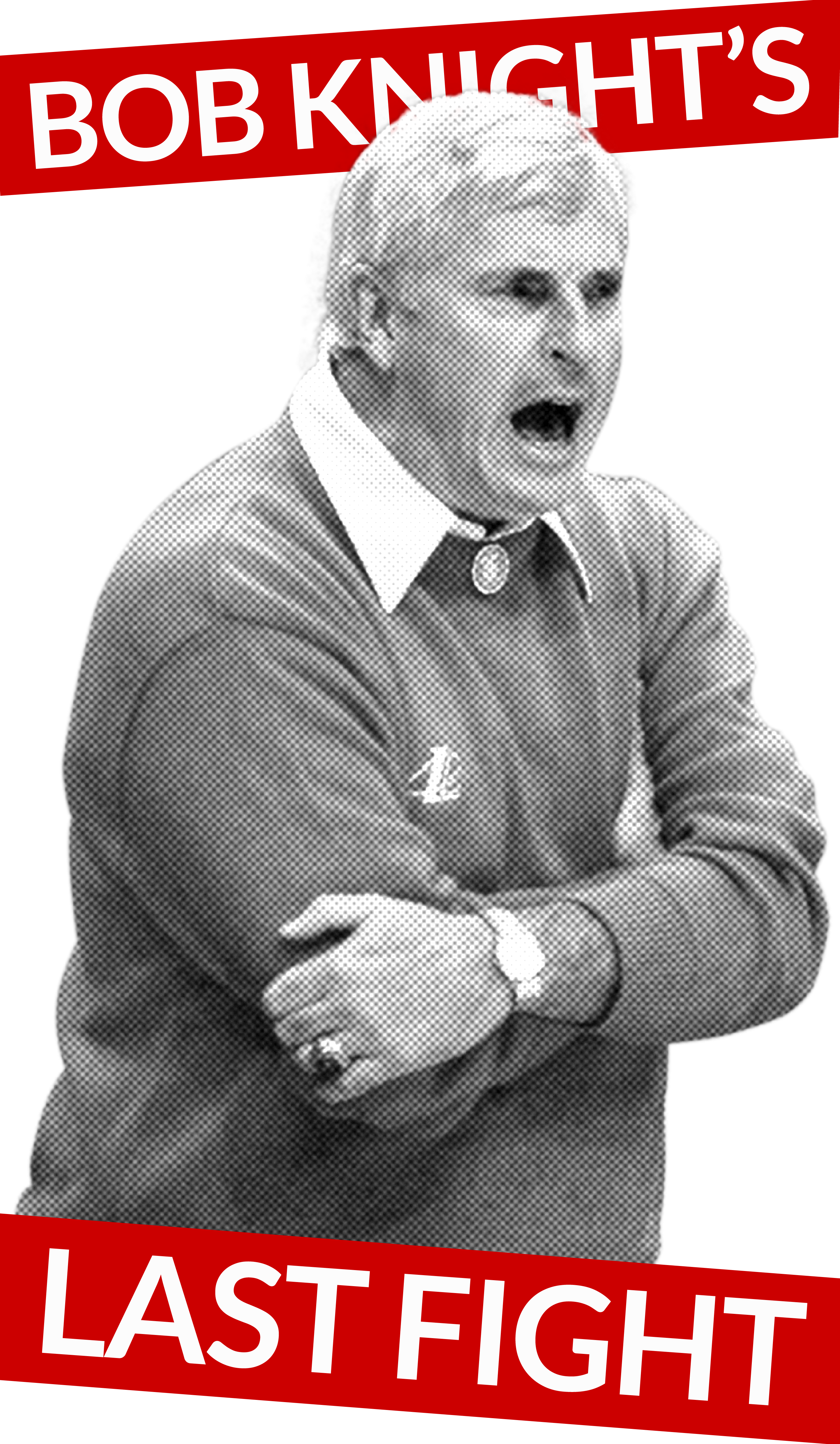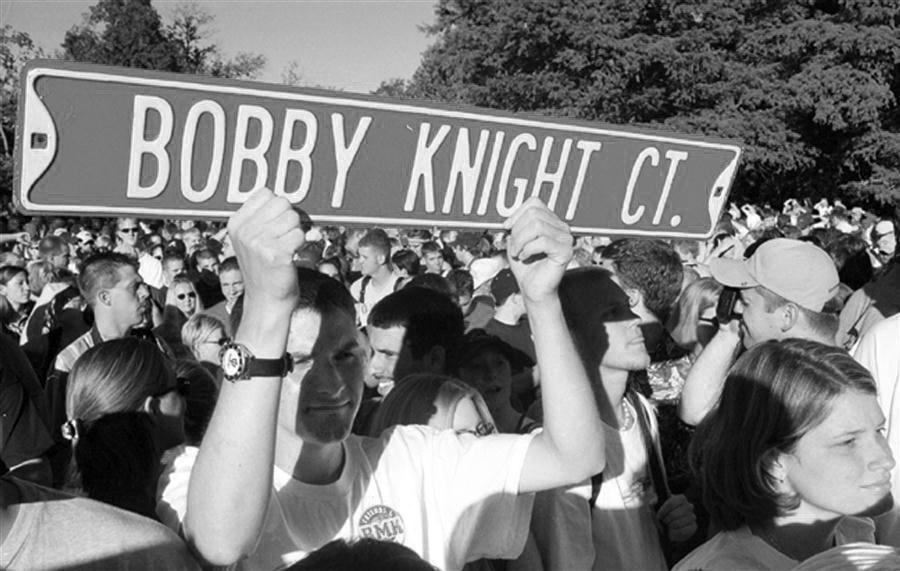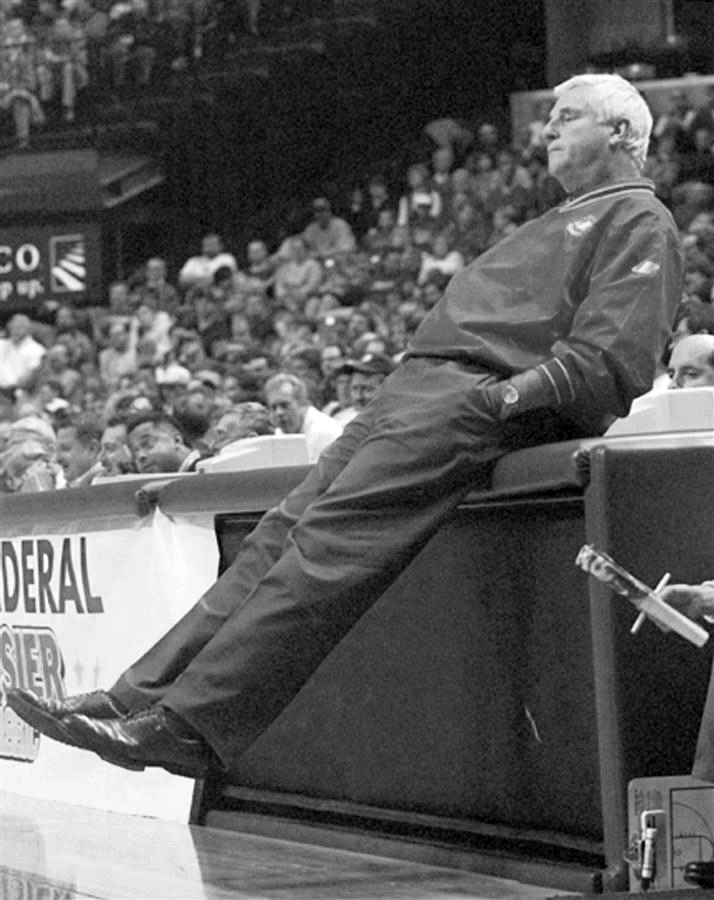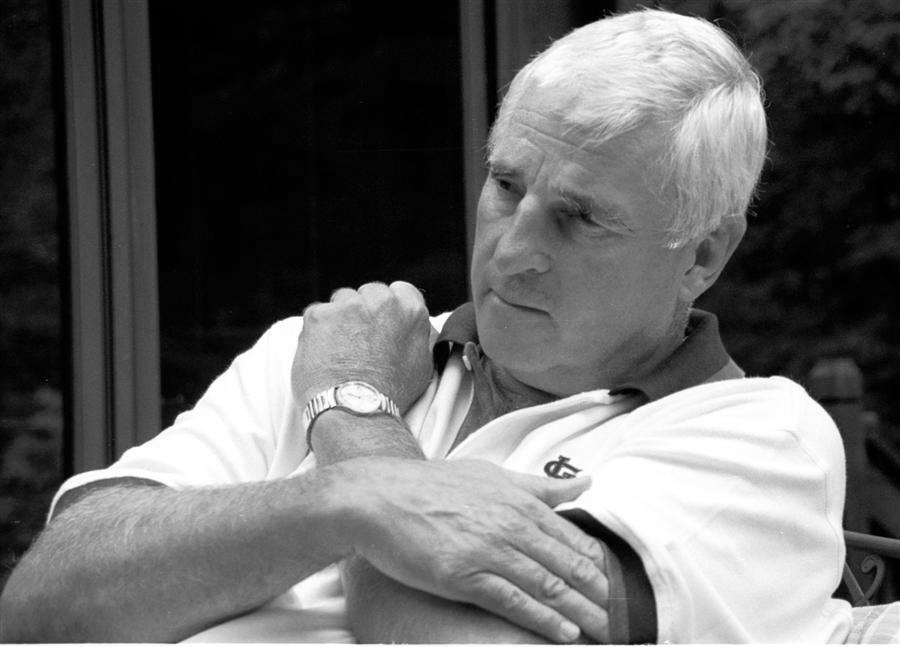


Bob Knight couldn't control that he would grow old one day. He just didn't get to grow old how he planned.
Bob Knight couldn't control that he would grow old one day.
He just didn't get to grow old how he planned.
Bob Knight likes hunting birds. Unlike land animals, birds can dodge and dart their way from a shot. There’s real skill in bringing one down.
This is Bob Knight. He wants as much competition as possible. Now that he’s retired, Knight has some extra time to hunt.
Whenever Knight tells his longtime scribe and good friend Bob Hammel he’s going out on a trip, Hammel likes to joke he’s rooting for “God’s creatures.”
Hammel remembers the time recently when Knight got back from one of his hunting trips and gave him a call.
“Well, it was God’s creatures: 1, Knight: 0,” he said laughing.
Wait, did Bob Knight just laugh off a loss?

Knight cares more about not losing than he does winning. He wrote an entire book on “The Power of Negative Thinking.” His strategy was less about what his team could do to win, but more what it had to do to keep them from losing.
He sweats the small stuff and lets nothing go. It’s what makes him the fiery, grudge-holding, controversial man he is.
That’s why one stops for a second to question Knight laughing off a loss. Sure, it’s just hunting, but it’s something.
Then, there's the fact he spoke at Bloomington High School North on Thursday. He was open with the fans who love him and reciprocated that love back. Knight even endorsed a new IU men's basketball coach.
These are things Knight doesn’t do. Even just a few weeks ago, Knight told Dan Patrick on the radio he hoped the IU administrators who fired him were all dead, and for those who aren’t, he said “I hope the rest of them go.”
He will always be a man of contradictions. His entire relationship with Bloomington is paradoxical. He’s the man everyone wants to move past but still wants to embrace.
He wants to be embraced by them, too. He got choked up when fans stood for him Thursday. He had plans of retirement in Bloomington spent watching IU games. That dream ending didn’t happen. Instead, he was fired for violating IU's zero-tolerance policy with his violent behavior.
He thinks his dream ending was robbed from him, others think he threw it away. Regardless, his bitterness from losing that dream is why he can’t go back to IU.
Knight is 76 now. He’s getting older. He walks a little slower. He has his memory lapses. It’s natural. But Hammel says Knight isn’t fighting the inevitability of aging.
“I don’t see any signs of bitterness or resentment about it,” Hammel said. “Sometimes when he draws a blank on something, he will just laugh about it and want me to fill him in.”
Knight doesn’t have a choice in this one. Everybody loses to time.

Knight slept on a pullout couch in high school — all 6-foot-5 of him. His grandmother needed the bed.
Knight wrote in his 2003 autobiography, “Knight: My Story,” about how much his grandmother Sarah Montgomery meant to him. He credits her for much of his belief system on negative thinking. In a 2013 New York Times interview discussing "The Power of Negative Thinking," he caught himself while talking about her.
“I’m glad you asked me, because I don’t think they put this in the book,” he said. “It’s supposed to be dedicated to my grandmother. Damn it — I’m going to call them.”
Montgomery’s influence implemented a strong idea in Knight that elders should be respected. He admits it helped him later connect with and learn from older coaches. He wanted to be respected like that.
“An element of his personality that people never grasped was the absolute reverence he had for older people,” Hammel said.
Coaches, strangers, anyone. He was more patient, more kind to older people. It wasn’t even age as much as generation, Hammel said. He wanted to learn as much as possible from older coaches like Pete Newell, Clair Bee, Joe Lapchick and Everett Dean — many of whom were in their 70s by the time Knight took over at IU.
Younger people or those Knight’s age had to prove themselves to Knight. Maybe that’s why when he talks of Quinn Buckner's intellect he gets so excited. Maybe that’s why Knight grabbed and scolded student Kent Harvey for saying, “What’s up, Knight?”
When a younger person impresses him, they really impress him, but not much angers him more than a lack of respect for elders.
Knight wanted to be one of those elder statesmen. He said in his autobiography he just cared about being respected as a coach. That’s why the broadcasting job at ESPN appealed to him so much after he retired. It was a chance to be “America’s Coach.” Unfortunately, he has become known as much for his negatives as his positives.
There isn’t an older generation for Knight to look up to anymore. He is the older generation now. Some of the IU administrators he wished dead, like former president Myles Brand, are already gone.
Someday soon Knight might have to turn around and enjoy who’s still here.

Knight had a seat picked out for where he would watch games after he retired at IU. It was just inside the south lobby of Assembly Hall in a spot where he could quickly get up and leave when he wanted. He figured Hammel would probably retire around the same time as him, so they’d sit there together.
“That didn’t work out,” Hammel said, followed by silence.
Knight never got the dream ending he craved. He didn’t get to finish as the legendary — and respected — figure he always hoped being a coach would make him.
Hammel isn’t sure he ever could have walked away, though.
Knight was close to joining CBS after the 1981 championship. He reached out to them about it. He came with ideas about interviews he wanted to do. He told the Boston Globe's Bob Ryan about how his idol, Ted Williams, mastered both hitting and fishing, and Knight wanted to master coaching and broadcasting.
Then player Landon Turner was seriously injured in a car accident, and Knight felt he needed to come back to raise money and help Turner.
“But it was always going to be something of that nature,” Hammel said, “because he put a lot into recruiting every kid.”
There were promises to each kid he recruited and their families. Retirement would mean leaving before fulfilling those promises.
We never got to find out if he could leave on his own. IU administration made Knight leave. They fired him in disgrace and took away his perfect ending.
It was a loss, and Knight doesn’t like losing.
It’s the greatest grudge he holds on to. The one that led to him saying he hopes people die. The one that, even during a happy, upbeat speaking event Thursday, he couldn’t help himself from mentioning “the sons of bitches I don’t give a damn about.”
He does give a damn. He gives such a damn that he mentions them every chance he can. He says awful things about them. Meanwhile, he laughs off getting older. He jokingly admitted Thursday “I’m getting old. I gotta straighten things out a bit.”
Knight couldn’t control whether he got old, but IU took away how he wanted to grow old.

The event at Bloomington High School North was running late.
Many people there knew Knight wasn’t the best guy on Earth, but they loved him. Others weren’t sure what to think of him. Some just wanted to see a legend while he was still able to speak publicly. But once Knight walked out those doors and shrugged in his red sweater, the people fell back in love with him.
He was there to say thank you, and he did it several times. In all of the years of hostility between himself and the University, the fans were always the children of divorce stuck in between. This thank you was only addressed to less than 3,000 people in attendance. This wasn’t some mending of a wound for all of Hoosier Nation, but it was a step.
Knight let people in Thursday night. He told stories ranging from his childhood baseball days to his glory days at IU.
When Pat Ryan, the widow of former IU President John Ryan, was pointed out to him, Knight hopped off the stage without using a step. The front row parted so he could reach her in the second row, and he hugged her.
“What the hell are you going to do to me?” she asked jokingly.
Fighting back tears, he said, “In all of my years in athletics, your husband was my favorite person.”
Another woman asked if she could take a picture with him in his bright red sweater. Knight obliged, hopped down with her, playfully smacked her behind and posed for the picture.
“I can’t smile,” he said. “If I do that, it will ruin my reputation.”
He read from a guide he gave to every player about what an IU basketball player should be. This declaration talked about how limiting mistakes is more important than good plays and how an IU player should conduct himself.
Then, it read, “He can only be defeated when a clock runs out of time.”